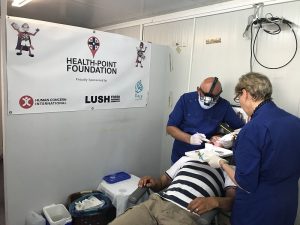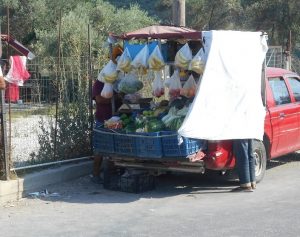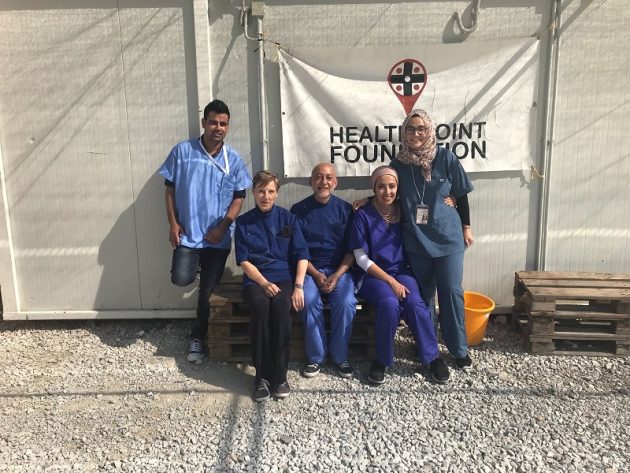In the second of two articles, the first was in last week’s edition, dentist and Rye resident Kyriacos Hajikakou shares his experience of volunteering among refugees in Greece.
The majority of patients were from Syria, Afghanistan or Iraq. We had the services of Amani as our Arabic translator whom we’d met before in Thessaloniki. She is Australian, of Syrian parentage, on a gap year after her arts degree and so inspired by the work she’d been doing that she was returning to Australia to study for a degree in nursing.
For the Afghani patients who spoke Dari (a language spoken in Afghanistan which is similar to the Farsi spoken in Iran) we were able to turn to Wais. He was a young man, a refugee himself, reticent about his reasons for leaving Mazur Sharif, who came in every day, quick and eager to learn and making himself very useful in a quiet, unobtrusive way.
Far more tricky were the patients from West Africa who spoke French. There were quite a few of these and there’s a big difference between using one’s rather rusty O-level French to get about whilst on holiday and trying to use that same French to explain a dental diagnosis and to obtain the patient’s informed consent. We had to go to the other charities in the compound to try to find French speakers to help us or put a call out for a refugee who also had a good command of English.
Some of the West African patients that I saw were unaccompanied minors – boys from Guinea aged 15 and 16. All had very poor oral health as did the vast majority of those whom I saw. There wasn’t the time to discover how they’d ended up in such a state, I had to do what I could to treat the most urgent problem and give advice on how to prevent further damage.
One lady came to me for severe pain in her back teeth. In fact her teeth were in good condition. I diagnosed (and the dental colleague working with me agreed) that she was suffering from bruxism (grinding of the teeth at night due to stress). There was the challenge of explaining this in French – we found a charity worker who could also advise that meditation and relaxation classes were available which would have been a useful thing for this patient to try but we could see that the patient went away unconvinced.
One of the frustrations of doing this type of emergency work in short intensive stints is that one is unlikely to know what becomes of the patients. Did the patient try the meditation? Did it help? I’ll never know. However, I was able to check on the progress of one young man for whom I’d done a difficult extraction at the beginning of the week which required stitches. He returned a few days later for these sutures to be removed and I was delighted to see that he was healing very well, his youth and good health being great points in his favour.

Speaking of frustrations – there are many – one is the knowledge that being able to take x-rays would aid considerably in giving an accurate diagnosis. For example, a 20-year-old Congolese man had collapsed with a heart condition and in the fall had hit his front teeth on a rock. What damage had been done? An x-ray would have told me. Knowing that HPF has the funds to buy a small hand-held x-ray machine but cannot get permission to use it is quite hard to bear. These Nomad x-ray machines are made in the USA, widely used in many European countries but not accepted by the Greek Ministry of Health. If you ask why then I can say that beyond the possibilities of ignorance, incompetence or malice I have no idea.
A young man came to see me saying that he needed a filling. He was a rare and refreshing instance of someone with excellent oral hygiene who simply had a little scale on his teeth. Although not an emergency it was so easily dealt with that I removed it and offered him reassurance that he was doing the right thing to keep his teeth in good condition, something that was very important to him. He was from Syria, had visible signs on his person that were consistent with his story of torture and had been in Moria for seven months.
He had just had his asylum claim interview only to be told that there was no translator available and that he should return in November. He felt that he couldn’t bear this and had decided to turn to the smugglers for assistance. Apparently Algerians are the best at this, the price to get to Athens is €1,000-1,500, to get out of Greece to northern Europe is €5,500. False documents and papers are supplied and it is something often resorted to by young single men.
The average length of stay in Moria is eight months but we met one man from the Ivory Coast who’d been there for two years. Having been processed in Moria, refugees are sent to Athens. Every morning we saw groups of desperate people, waving their papers, crowding around the gate of the compound where these interviews took place. In Athens the average wait is two years before moving on elsewhere.
As on previous trips most people mentioned Germany as their preferred destination though Holland, Belgium and Sweden also got a mention. Some refugees have been granted asylum which would allow them to leave the camp and find work, but without any Greek or English and without relevant skills they have no choice but to remain living in the camp.

On the bus one morning we got talking to a young Iraqi man. He was with his family (mother, father and young sister) and they were living in Kara Tepe which is a much smaller camp set out like a pleasant village among the olive groves with a calm and ordered air rather than the sinister atmosphere of Moria with the theft and violence that blights the lives of many of its residents.
Kara Tepe was set up for vulnerable refugees but with the relentless influx of people it quickly became full. Those who would have been deemed vulnerable and allowed to move to Kara Tepe earlier in the year now no longer fulfil the criteria because the rules are becoming ever tighter. This young man had scars which he said he’d received during a sectarian attack in Baghdad. He’d fled Iraq, made his way to Germany, been granted leave to stay and had lived in Germany for two years. However, he missed his family so much that he’d returned to Iraq to bring them back with him. He was facing scepticism from the German migration authorities who were questioning his decision to return voluntarily to Baghdad when he’d said that it was too dangerous a place for him to be.
So our work in Moria camp had its challenges. The camaraderie of colleagues is a great help, we have been fortunate in working with wonderful people some of whom have become friends and visited us in Rye. On the plane back we were seated next to a young woman who was returning home for a break from her work with the small charity Refugee Rescue which is on 24-hour stand-by to rescue migrants in trouble off the northern coast of Lesbos. This is the point nearest to Turkey less than four miles away.
The smugglers crowd people (as many as 45) into small dinghies with small outboard motors. One refugee is put in charge of the boat and told to steer for a lighthouse. However, the lighthouse is positioned to warn sailors of dangerous rocks and treacherous currents so is the worst place to be heading for and hence the need for this charity’s work.
Once brought ashore, refugees are housed for a short time in a temporary camp with only the most basic facilities before being transferred to Moria. At the end of May there had been big trouble in Moria with clashes between large groups of Syrians and Kurds resulting in hundreds of Kurdish families leaving Moria for the safety of the temporary camp, which was quite unable to cater for them. Work was going on to try to persuade them to return to Moria, just one story among many that one never hears of unless one is on the ground or has local contacts.
This last trip was an eye-opening experience. The question of refugees travelling from Turkey to Greece has largely fallen off the news agenda but I can confirm that it is still continuing, that there are many thousands of people on various Greek islands (Lesbos is not the only one) and that their position is pretty desperate. I don’t like to end in such a downbeat way but I found it hard to be positive about the overall situation. We went to Lesbos, did what we could, met many people doing the best they could to get by and for whom one felt great sympathy.
Photos: Kyriacos Hajikakou



